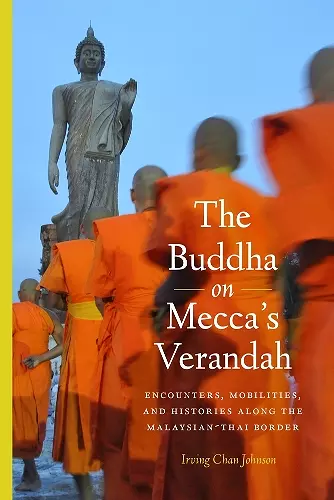The Buddha on Mecca’s Verandah
Encounters, Mobilities, and Histories Along the Malaysian-Thai border
Format:Paperback
Publisher:University of Washington Press
Published:10th Jan '13
Currently unavailable, and unfortunately no date known when it will be back
This paperback is available in another edition too:
- Hardback£95.00(9780295992037)

This book offers a distinctive take on border peoples and places. The son of a Malaysian Thai mother and American father, Johnson is at once the observer and himself an example of a trans-border person. It is the outsider/insider tension that makes the work particularly compelling. -- Charles Keyes, University of Washington This book represents in-depth, qualitative research into the daily lives of the Thai peasants in Kelantan and the dilemma of identity that they face. One of its strengths is the author's privileged access to the social field; he makes no secret that he is part of this village universe and he consequently makes a very original contribution to the literature. -- Alexander Horstmann, Max Planck Institute for the Study of Religious and Ethnic Diversity
Examines the many ways in which people living along an international border negotiate their ethnic, cultural, and political identities
The Buddha on Mecca's Verandah examines the many ways in which people living along an international border negotiate their ethnic, cultural, and political identities. This ethnography of a small community of Thai Buddhists in the Malaysian state of Kelantan draws on rich, original vignettes to show how issues such as territoriality, identity, and power frame the experiences of borderland residents. Although the Thai represent less than 10 percent of the Kelantan population, they are vocal about their identity as non-Muslim, non-Malay citizens. They have built some of the world's largest Buddhist statues in their tiny villages, in a state that has traditionally been a seat of Islamic governance. At the same time, the Thai grapple with feelings of social and political powerlessness, being neither Thai citizens nor Muslim Malaysians. This thoughtful study offers new perspectives and challenges the classical definition of boundaries and borders as spaces that enforce separation and distance.
With insights applicable to comparative border and frontier studies around the world, The Buddha on Mecca's Verandah will appeal not only to anthropologists but also to specialists in Asian and Southeast Asian studies, cultural geography, religious and ethnic studies, globalization, and cosmopolitanism.
“Johnson’s careful documentation of local histories is an important contribution and gives unusual time depth to his discussion of contemporary ethnic identification. Consequently, this book is a valuable addition to studies of Thai ethnicities, particularly the complex formations of Thai-ness that take shape on and around the borders of Thailand.
-- Mary Beth Mills * Pacific Affairs: Volume 86 *"The Buddha on Mecca’s Verandah is a captivating narrative of how a marginalized minority inhabiting the complex reality of a borderland area manages its cultural political identity....This book presents the results of a much-needed investigation that further contributes to our understanding of inter-ethnic relations in Malaysia, Thailand's own religious politics, and the legacy of British colonialism in Southeast Asia to mention just a few. More generally it is a welcome addition to the literature on ethno-religious diversity, borderland histories, and identity construction."
-- Chiara Formichi * Southeast Asian Studies *"This ethnographic consideration of an overlooked borderland is a welcome addition to Southeast Asian Studies. Recommended."
* Choice *"Original and important. . . . The Buddha on Mecca’s Verandah remains one of the most nuanced and detailed ethnographic studies of a single minority community in Malaysia. The range of sources Johnson employs, the nuance of analysis, and the depth of his arguments make this study an essential one to scholars and graduate students interested in Buddhism, Southeast Asia, Malaysia, and minority identity."
-- Jeffrey Samuels * Journal of Asian Studies *"An empirically rich, clearly written ethnography. . . . Johnson’s monograph raises descriptive dilemmas and interpretative questions that are worth pursuing more broadly in academic scholarship on modern Asian Buddhism. . . . The overall vision of Ban Bor On as a mobile village of Thai Buddhists struggling with and against their invisible, minority, and peripheral status as Malaysia citizens is illuminating, accessible, and thought-provoking whether one is a general academic reader or a regional or disciplinary specialist."
-- Erick White * H-BuddhiISBN: 9780295992044
Dimensions: unknown
Weight: 340g
246 pages